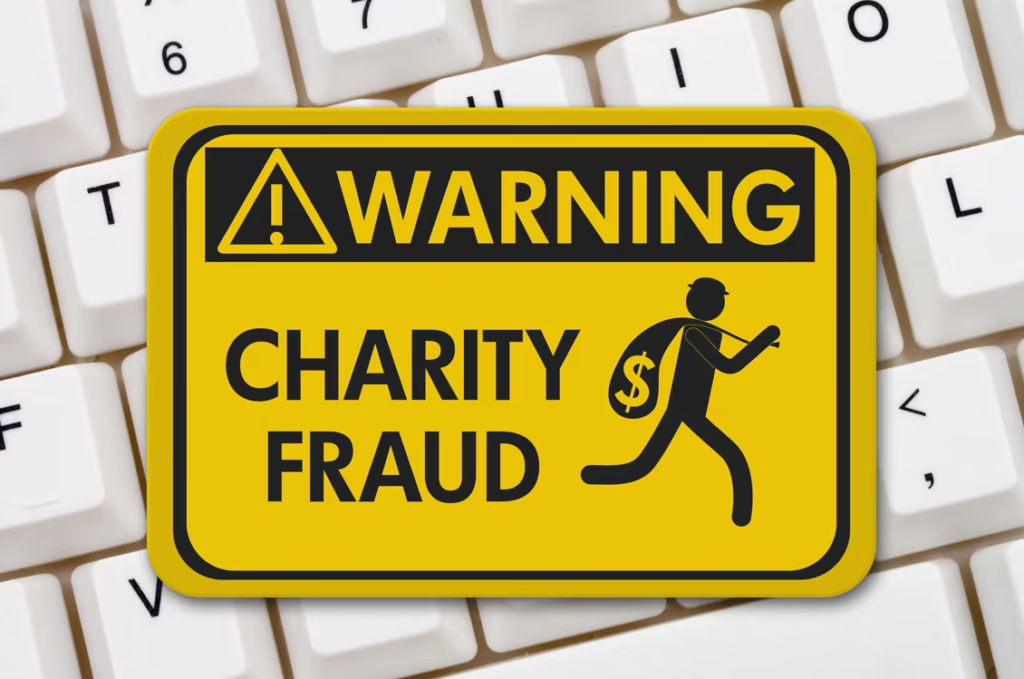
Charitable giving can reduce taxes, but scams are rising. Learn how to spot fraud, protect your donations, and ensure your contributions are legitimate.
Understanding Charitable Contribution Scams
Charitable scams often target taxpayers during times of crisis or around tax season, exploiting the goodwill of individuals looking to support a cause. These schemes are designed to mislead donors into contributing to fake charities or manipulating legitimate contributions for fraudulent tax benefits.
Common Types of Scams
- Fake Charities
Scammers set up organizations that resemble legitimate charities, often with names similar to well-known nonprofits, to trick donors into giving money. - Overstated Deductions
Fraudsters may promote inflated or entirely fabricated deductions for charitable contributions, enticing taxpayers to falsely reduce their taxable income. - Donation Misclassification
Scams may involve misclassifying non-qualifying contributions, such as political donations, as tax-deductible charitable gifts. - Exploiting Crises
During disasters or global emergencies, scammers create fraudulent charities claiming to help victims, diverting funds for personal gain.
IRS Warning Signs of Charitable Scams
The IRS highlights several red flags to help taxpayers identify potential scams:
- High-Pressure Tactics: Scammers may rush donors into giving money without proper verification.
- Unverifiable Information: Fraudulent charities often lack proper contact information or an Employer Identification Number (EIN).
- Requests for Cash or Gift Cards: Legitimate charities rarely request cash donations or payments via gift cards.
- Social Media Promotions: Scams frequently use social media platforms to spread misinformation and solicit donations.
- Promises of Large Refunds: Be wary of anyone claiming charitable contributions can result in unusually large tax refunds.
Protecting Yourself from Charitable Scams
To avoid falling victim to these schemes, taxpayers should take proactive steps when donating:
1. Verify the Charity
Use the IRS’s Tax Exempt Organization Search Tool to confirm a charity’s eligibility to receive tax-deductible contributions.
2. Avoid Emotional Appeals
Scammers often use emotional stories to pressure donors. Take time to research before making any decisions.
3. Never Provide Personal Information
Legitimate charities will not ask for sensitive personal or financial details over the phone, email, or social media.
4. Keep Detailed Records
Maintain receipts, donation acknowledgments, and any correspondence related to your contributions. These records are essential for tax reporting and verifying legitimate donations.
5. Consult a Tax Professional
If you’re unsure about the legitimacy of a deduction or donation, seek advice from a qualified tax advisor.
Taxpayers Beware: The Consequences of Falling for Scams
Engaging in or unknowingly supporting fraudulent charitable schemes can have serious repercussions:
- Loss of Money: Donations made to fake charities are unlikely to be recovered.
- Legal Issues: Misreporting deductions, even unintentionally, can lead to audits, penalties, and interest on unpaid taxes.
- Identity Theft: Scammers who obtain personal information can use it for identity theft, further complicating your financial situation.
How to Claim Legitimate Charitable Contributions on Your Taxes
When donating to eligible organizations, ensure your contributions qualify for tax deductions by following these steps:
1. Confirm Eligibility
Check the IRS database to verify the organization’s tax-exempt status.
2. Document Contributions
Keep written acknowledgment for donations over $250, including the amount, date, and description of the gift.
3. Understand Deduction Limits
The IRS allows you to deduct up to 60% of your adjusted gross income (AGI) for cash contributions, depending on the organization.
4. Include the Proper Forms
Use Schedule A (Form 1040) to itemize deductions for charitable contributions.
5. Differentiate Between Donations and Expenses
Ensure only qualifying contributions are claimed. Political donations, for instance, are not tax-deductible.
Real-Life Examples of Charitable Scams
Case Study 1: Disaster Relief Fraud
After a natural disaster, scammers created a fake charity that solicited donations via email and social media. Donors who didn’t verify the organization’s legitimacy lost their contributions to fraudsters.
Case Study 2: Tax Refund Scams
A scammer promoted a scheme encouraging taxpayers to inflate their charitable deductions, promising larger refunds. Many participants faced audits and penalties when the IRS discovered the fraud.
The IRS and Security Summit Initiatives
The IRS, in partnership with state tax agencies and the private sector, has developed initiatives to combat charitable scams:
- Education Campaigns: Public awareness efforts, like the National Tax Security Awareness Week, help taxpayers recognize scams.
- Enforcement Actions: The IRS investigates and prosecutes fraudulent charities and promoters of tax scams.
- Improved Reporting Tools: Taxpayers can report scams directly to the IRS through Form 13909, the Tax-Exempt Organization Complaint Form.
How MCMG Tax Can Help
Navigating the complexities of charitable contributions and avoiding scams requires expertise. At MCMG Tax, we provide:
- Expert Guidance: We help verify legitimate deductions and ensure compliance with IRS regulations.
- Recordkeeping Support: Our bookkeeping services ensure all donations are properly documented and tax-ready.
- Fraud Prevention Tips: We keep you informed about the latest scams and how to avoid them.
Conclusion
Charitable giving should be a rewarding experience, but rising scams demand vigilance. By staying informed, verifying organizations, and working with trusted tax professionals, you can protect your finances and contribute confidently.
Ready to maximize your charitable giving while staying compliant? Contact MCMG Tax today for expert advice and support to keep your finances safe and secure.
